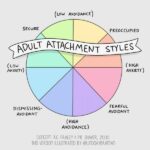Psychology research and pop social science reads alike have discussed the topic of attachment theory to understand adult attachment styles. These forms of attachments were originally developed to explain childhood bonds with caregivers, and how that influences social and intimate relationship roles throughout adulthood. Among these styles are anxious, avoidant, or secure attachments, which can help individuals understand how they select romantic partners and function in relationships. For instance, an avoidant attachment style may be inclined to shut down or push away intimacy because they interpret it as losing one’s independence and feeling stifled. An anxious attachment style may tend to be preoccupied with having and potentially losing love. In contrast, a secure attachment entails honest communication and a healthy approach to romantic intimacy. Is there a particular attachment style you resonate with?
New York Times reviewed an ever-growing popular book called “Attached”, appropriately named for its discussion of adult attachment styles. The feedback among readers of the book indicated that learning about attachment styles gave them the ability reflect on their past relationships from a new perspective. For example, some individuals stated that this theoretical topic offered insights to help demystify why a seemingly stable relationship abruptly ended in a dramatic fashion. People may feel validation, closure, or peace through the process of building a framework to conceptualize who they are and how they interact with others.
A criticism of these attachment categories is that it is simply one theory to explain the complexity of humans, and not all people identify as having only one distinct style. Likewise, there are concerns that our society is fixated on the notion of creating a minimalist, single-term category to explain all realms of personality, habits, and themes, similar to the fascination with Zodiac signs. The attachment style theories can evoke curiosity and objective learning points about social psychology and how you fit into the context. On the contrary, when such theories create stereotypes, judgment, shame, or limits on your capacity to adapt or identification as a multifaceted person, then it becomes more harmful than helpful. This is not to say that gaining knowledge about human behavior theories is detrimental to one’s journey toward self-discovery. In fact, learning about behavioral patterns and interpersonal proclivities can help an individual pinpoint what is effective or ineffective, and perhaps even how to interrupt the negative or unfulfilling cycles in relationships. Although self-help books are certainly not a sufficient replacement to therapeutic work with a professional, such topics can help raise awareness and gain insight in areas that other people may overlook or perceive to be their doomed fate. From a mental health perspective, learning about the evolving self should be a life-long process that derives from many sources, and entail life experiences and insights in order to work toward an authentic sense of self. As quoted by Aristotle, “Knowing yourself is the beginning of all wisdom.”
Psychology allows today to recognize self-destructive patterns that some older people have towards their overall health. And it is that at that age it is well known that arthritis problems are one of the most common ailments, however, few people in this age group are properly cared for to remedy these problems. Today many reliable pages, for example, offer good packages that allow this group to remain in constant knowledge that their ailments do not always have to be that, that they can be carried with greater dignity with the appropriate treatments and you will see forever on pages like UK Meds shows “in stock”, because they know where it matters to have the products for the people who need it most
